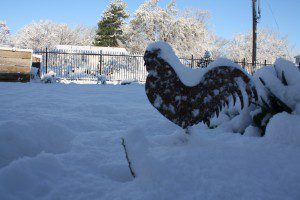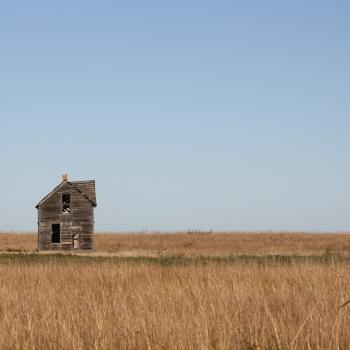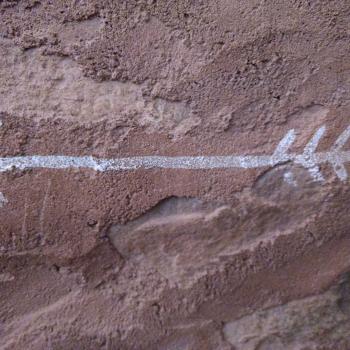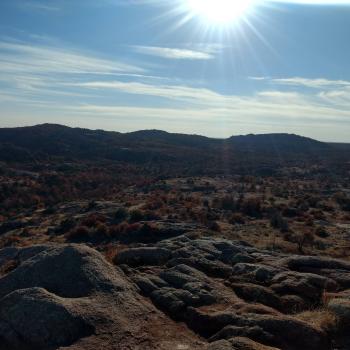
On the morning of the great blizzard, and I set out to make pastoral visits.
Sensible pastors would have called and canceled, sweeping their schedule clean so that they could dig in to the mounting snow. But I didn’t take pride in being a sensible pastor. I was the pastor who visited his flock, come hell or high water, more zealous than those postal carriers swiftly completing their appointed rounds despite snow, rain, heat, or gloom of night. So I went, following the delicate tracings of tire tracks onto the remnant of road out into open sagebrush country.
But the truth is, I wasn’t being zealous. Really, I was running scared–scared that I would be seen as a ministerial slacker, someone lazing in the office while my congregants went about their real jobs, a mediocre pastor stumbling into the cardinal sin of evangelical ministry: not being available.
And so I drove straight into the heart of that that whiteout sky avalanche. Amazingly, I didn’t get stuck, though I did have to leave my car at the bottom of a hill and trudge up to one family’s trailer for their visit.
It’s all too easy for pastors to define themselves by what their congregations want from them. Of course, living up to our job descriptions occasionally is not a bad thing. But many of the pressures faced by pastors flow from the general human anxiety of identity. Who am I? Who am I supposed to be? Who do other people suppose and hope and want me to be?
Jesus was tempted by identity questions like these. The devil sidled up to him among the rocks and sand, a svelte glimmer bearing temptations of fame, power, and bread. Who are you? Who can you be? And Jesus, praying in the desert’s haze and grit, turned to Scripture and to his own bedrock identity affirmed in his baptism in the Jordan where the Father said: You are my Son, my beloved, with you I am well pleased. Jesus saw off the devil’s ladder to fortune and turned his face to Jerusalem and the cross.
Jesus refused to allow his identity to be governed by human need. He was on mission, about the will of the Father, but what concern was it to him if the wedding wine ran dry, or if sick people were searching for him in the morning when he prayed or if the teachers of the Law demanded an answer, nice and clear and on their terms (John 2:4; Luke 4:42; Matthew 21:23)? Put your hand to the plow and go, people! Or don’t. It’s up to you. No convincing and cajoling. We’re on to Capernaum.
There was a night when Jesus instructed his disciples to cross the Sea of Galilee. He would meet them on the other side. Don’t worry about the how, it’s the why that matters here: he needs to pray, and they need to row. And in the night, with the wind tugging at their sail and exhaustion tugging at their arms, the disciples drift. Jesus spots them, goes down to the shore, lets the water lap over his sandals, and strides out across the waves. Here he comes, the hero from above, god or ghost the disciples can’t be sure, but he will save them in their hour of desperation.
Except for a little detail in the gospel of Mark, that writer who Hippolytus called “stub-fingered” for his habit of telling the story straight in stubborn, Hebraized Greek. Mark says that as Jesus approached those hand-selected disciples in their swaying boat, “he intended to pass them by” (Mark 6:48). So much for Super Jesus to the rescue.
Jesus does save them, but because of his love, out of his mercy. Their need can’t define or compel or corral him. He is, after all, the embodiment of “I Am Who I Am,” the one whose I am knocks soldiers to the ground, the one who says “I am the Alpha and the Omega” (Exodus 3:14; John 18:6; 22:13).
In the book, A Horse and His Boy, the boy Shasta asks Aslan–C.S. Lewis’ leonine avatar of Christ–who he is, and Aslan replies three times, “Myself.” He is not who Shasta hopes or supposes or needs him to be. Who are you? I am Myself.
Just as Jesus was himself, grounded in his identity as the beloved Son of God, we his disciples are called to become ourselves. We do this not by rummaging around in the basement closets of our subconscious. Who knows what we’ll turn up down there? We become ourselves by becoming ourselves in him. This is why Paul wrote that it is “Christ in you, the hope of glory” (Colossians 1:27). This is why he said it is no longer “I who live but Christ who lives in me” (Galatians 2:20). Paul saw the Christian journey as one of growing up into maturity in Christ (Ephesians 4:13).
In the spirit of Lent, becoming ourselves in Christ will mean dying to the expectations and hang-ups of others. At least, those things won’t define us. Through prayer, giving, and fasting–Jesus’ three, core spiritual disciplines (see Matthew 6)–we’ll begin to shed false expectations and re-discover the foundation of our identity and selfhood in Jesus’ love (1 Corinthians 3:11).
That wouldn’t be a bad place to start if we seek to become a little bit more ourselves. It might just give us the courage to look out into the great blizzard…and make hot chocolate.












